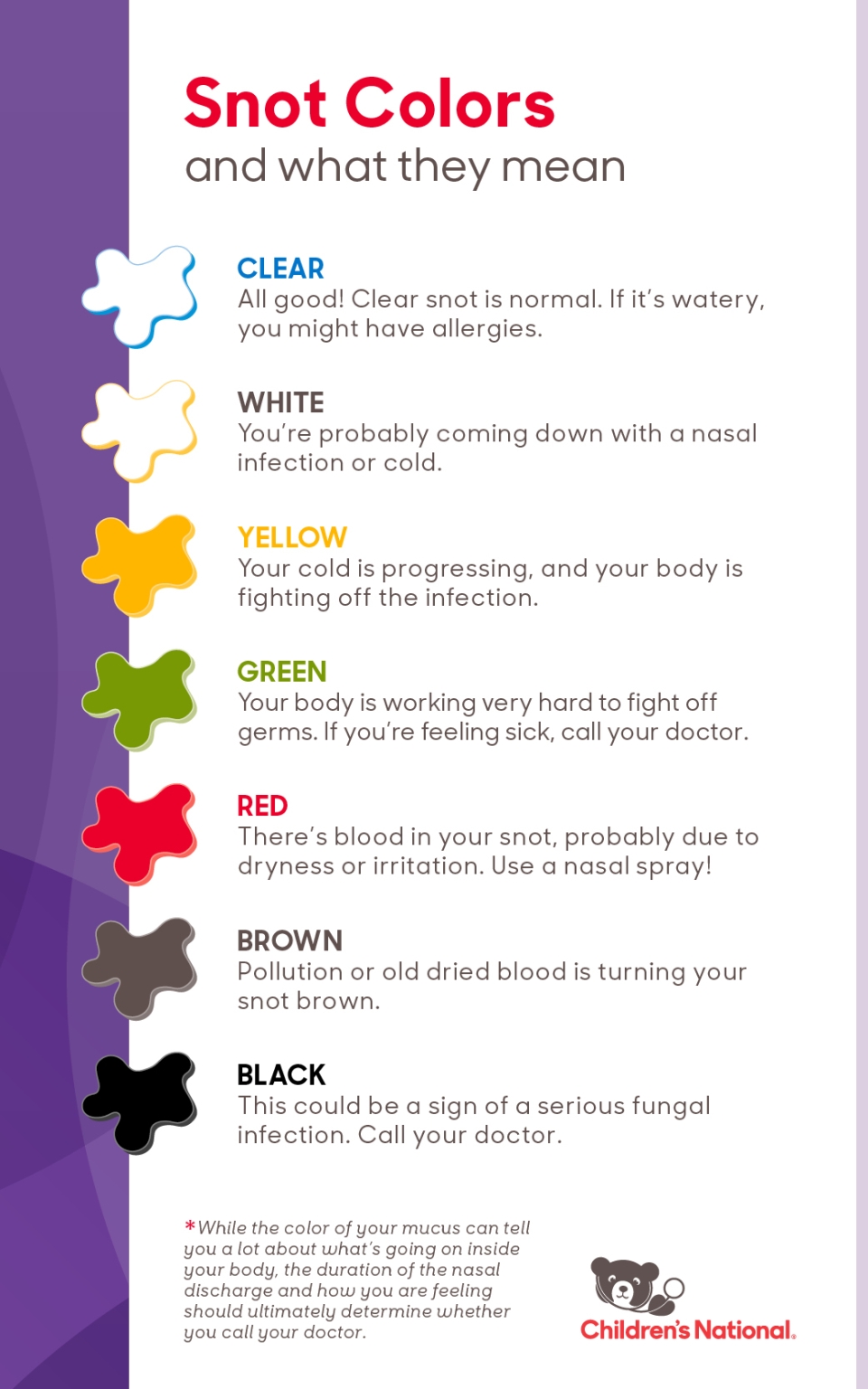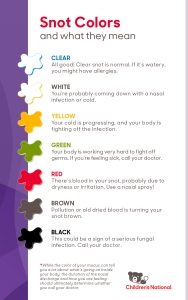Ever blown your nose and wondered what the color of your snot means? It’s not something we usually talk about openly, but the truth is, snot can offer valuable clues about our health. While a runny nose itself might seem trivial, the color and consistency of your nasal discharge can reveal a lot about what’s going on inside your body.

Image: riseandshine.childrensnational.org
Let’s face it, snot isn’t the most pleasant topic. But understanding what your snot is saying can actually help you navigate those sniffles and other ailments. So, grab your tissues, because we’re diving into the fascinating world of snot and its color-coded messages.
The Role of Mucus
First, let’s talk about the hero of the story: mucus. We often think of mucus as something gross, but it’s actually a vital part of our immune system. It’s a sticky, gel-like substance made up of water, proteins, and salts that lines our respiratory tracts. Think of it like a protective barrier – a first line of defense against bacteria, viruses, and allergens.
Mucus traps these invaders, preventing them from reaching our delicate lungs. It also acts as a natural humidifier to keep our nasal passages moist. Plus, it gets rid of waste like dust and pollen, keeping our airways clean.
The Colorful World of Snot
Now, let’s get to the heart of the matter: the colors of snot. While clear snot is perfectly normal, other colors can indicate different things.
Clear Snot: The Perfect Picture of Health
Let’s start with the good news. Clear snot is a sign your body is doing its job – effectively filtering and cleaning your nasal passages, just like it should. It’s typically thin and watery and often goes unnoticed.

Image: lorisbradford.blogspot.com
White Snot: A Sign of a Little Cold
White snot is often a tell-tale sign of a common cold or sinus infection. It might be thicker than clear snot and even appear slightly cloudy. This is because white snot often contains white blood cells – our body’s army fighting off the infection.
Yellow Snot: Time to Fight!
Yellow snot, a little more noticeable than white, signals that your body is in the midst of a battle. The yellowish hue comes from the presence of dead white blood cells, which are trying to take down the invaders. While it’s just your immune system doing its job, it might indicate you need to rest more and drink plenty of fluids.
Green Snot: Your Immune System’s Hard Work
Green snot is the outcome of a longer battle. It’s often thicker and sometimes a little pasty. The green color points to the presence of neutrophils, a type of white blood cell that releases enzymes to fight off infection. More green snot can mean it’s time to see your doctor.
Brown Snot: Warning Signs to Watch
Brown snot, often thick and sticky, can be more serious. It’s usually caused by old or dried-up blood. This could be the result of sinus infection, a nosebleed, or even a more serious condition.
Red or Pink Snot: A Nosebleed?
Red or pink snot is a clear indicator of blood in your nasal passage. While a quick nosebleed is usually nothing to worry about, if it’s persistent or accompanied by other symptoms, seek medical advice.
Black Snot: A Sign of Something More Serious
Black snot is the most alarming color, and it’s usually not a good sign. It could indicate exposure to things like coal dust, smoke, or even fungi. If you notice black snot, it’s essential to contact your doctor directly.
The Importance of Consistency
While color is a vital clue, the consistency of snot also plays a role. Thick, sticky snot might indicate a thicker infection and may require a different approach to treatment. Thin, watery snot, on the other hand, may be part of a normal clearing process.
What To Do?
If your snot is unusually colored or accompanied by other symptoms like fever, headache, or sore throat, don’t hesitate to contact your doctor. They can help determine the underlying cause and recommend appropriate treatment.
A Final Note on Common Cold Remedies
While there’s no magic cure for the common cold, simple remedies like rest, fluids, and over-the-counter medications can ease your symptoms. If you’re feeling congested, consider a saline nasal spray or a humidifier to help thin out your mucus. But always consult with your healthcare professional for personalized advice.
What Do The Colors Of Snot Mean
The Takeaway
Remember, your snot is your body’s way of telling you something. Pay attention to the colors and consistency, and don’t be afraid to reach out for professional guidance if you’re concerned. Taking care of your health doesn’t have to be a gross experience – it can be a journey of understanding your body and making informed decisions about your well-being. And maybe, just maybe, the next time you blow your nose, you’ll have a little more appreciation for that essential, often overlooked, part of your body.






